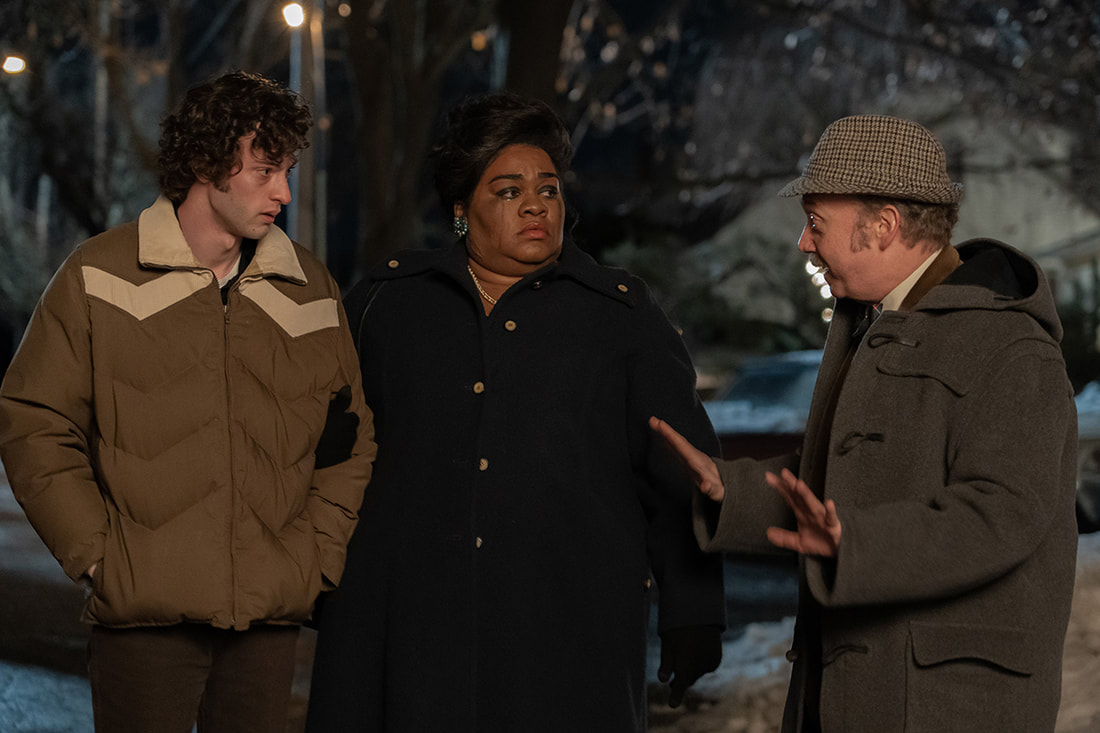Evan D.By the time Hunham (Paul Giamatti) and Tully (Dominic Sessa) wander through an ancient art museum in Boston, its already achingly apparent that the yearning for connection felt by the pair is an eternal truth. The Roman Empire was made up of people, and people invariably seek out connection. “There is no new human experience” Hunham declares and perhaps he’s right. The Holdovers is set in the winter of 1970 but in reality the ideas it explores are timeless. Boys have been sent off to die at war for as long as war has existed and the people left in their wake have always been splintered by loneliness. An early scene sees the graves of a collection of young men killed in World War I and II before expanding out to all the boys of Barton boarding school gathering for the funeral of a young alumnus killed in Vietnam. A long line of carnage that the carefree students step over to get to their winter vacation. Not all of them are so lucky. A handful of students, the holdovers, have no family to return to or nobody willing to take them for the break. Left with the duty of watching these wayward souls is Paul Hunham, the demanding and reclusive ancient histories teacher and Mary Lamb (Da’Vine Joy Randolph,) head of the kitchen and mother to the young man whose funeral marked the end of term. Hunham was forced into this duty as punishment for failing the son of a Senator and prominent donor. Mary feels like leaving would be tantamount to abandoning her son. The boys left behind clearly feel abandoned to a degree but it hides behind their entitlement and youthful rebelliousness. Chief among them is Angus Tully, whose mother is too busy with her new husband to tend to her grieving son. Never uproarious but consistently funny, The Holdovers manages to capture the intertwining of good spirits and melancholy that define the holiday season. Hunham and Tully are constantly at odds with one another, mining genuine humor out of the plight they jointly face. As the season grows colder the pair begin to thaw and connect over small acts of kindness. Not to forget Mary, who is the true emotional center of the film. Her resiliency through unimaginable grief really grounds the whole story. The chemistry between the three is electric and all the more impressive by the fact that this is Dominic Sessa’s debut. Director Alexander Payne has a history with Paul Giamatti and the pair strike gold here. His curmudgeonly demeanor and steadfast commitment to principles and discipline contrast sharply with Sessa’s, at times, almost feral rawness. Best of them all though is Da’Vine Joy Randolph who captures the pain of a mother adrift in loss. I’d also be remiss not to mention the brilliant music work at play. Subtle Christmas carols score much of the film, not only setting a definite sense of place but also echoing in the void of what these characters are being deprived of in their isolation. The soundtrack is composed of nothing but perfect low-key folk tunes that consistently elevate the quiet passing of time at Barton. All of these elements pair beautifully with the old school flourishes of a film actually made in the 70s. Payne and cinematographer Eigil Bryld shot The Holdovers digitally but took great care to artificially imbue it with the fuzzy and scratchy hallmarks of films shot in the 60s and 70s. It may not be film, but it reliably mimics the form and provides a wonderful lived in intimacy to the halls and dorms of the fictional academy. Even for all its retro aesthetic, The Holdovers feels right at home in today’s environment. So much of the film is steeped in the entitlement and inequality perpetuated by rich kids at elite schools dodging the responsibilities and trauma faced by the less fortunate among them. Mary’s son was smart and capable but he wasn’t rich so he was sent off to war while his classmates rode off to elite schools and positions of influence. Is that all so different from the tolls inequality has placed on society today? Life certainly isn’t all that different at Barton in 1970 than it was many years prior when Hunham was a scholarship student. His supposition that history is littered with the same defining characteristics of loneliness, cruel bourgeois and, crucially, hope underlines the whole tale. These character may not be experiencing something new in the scope of millennia, but their personal journeys are novel to them. The connections the forge through hard work and compassion do radically change them for the better. 9/10
Comments
|
Categories
All
Archives
April 2024
|
